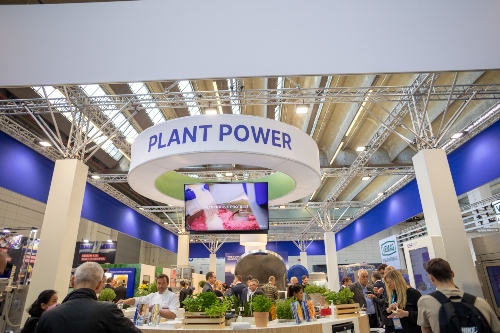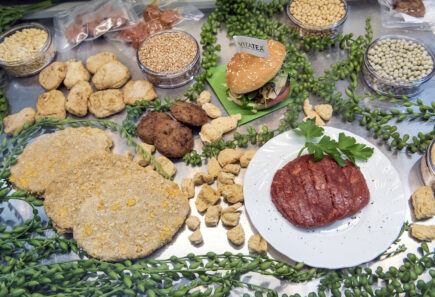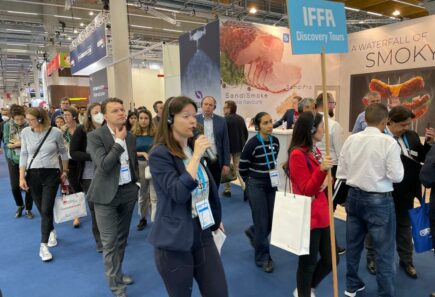How sustainable proteins took centre stage at a meat industry trade fair
25 May 2022
For many meat industry representatives at the IFFA trade fair, plant-based, cultivated meat and fermentation are the growth areas.

Credit: Messe Frankfurt GmbH / Jochen Günther
If ever we were looking for proof that the conventional meat industry had recognised the potential of sustainable proteins, the IFFA trade fair was the moment we found it.
The event, held in Frankfurt last week, was always going to be significant. The fact that the Good Food Institute Europe was partnering with organisers Messe Frankfurt for the world’s biggest conventional meat trade fair was a major step into the mainstream for the plant-based, cultivated meat and fermentation sectors.

Credit: Messe Frankfurt GmbH / Petra Welzel
Working with the existing meat industry is vital to addressing animal agriculture’s contribution to climate change, deforestation, antibiotic resistance and zoonotic diseases.
This sector has the infrastructure and commercial understanding necessary to accelerate the development and scale-up of sustainable proteins – making them as delicious and affordable as conventional meat, so that sustainable choices are appealing and accessible to everyone.
My colleagues and I were there to demonstrate the enormous opportunities these sectors offer to the industry, and to provide advice about how they can use their expertise to develop delicious and sustainable new products – so they can support Europe’s transition to a more sustainable food system.
With nearly 50,000 people from 129 countries travelling to Frankfurt for the event, there were plenty of opportunities. But the level of interest my colleagues and I encountered far exceeded our expectations.
A wide range of people were keen to talk to us and learn more about sustainable proteins – from entrepreneurs and startups to scientists and representatives of established food production companies.
It was great to see the huge range of meat companies represented at IFFA – from artisanal butchers to large-scale manufacturers. In business, just as in nature, a diverse ecosystem is a healthy one – and it will take producers of all shapes and sizes to realise the full potential of sustainable proteins.
I heard time and time again that, in many of these companies, sustainable proteins are the growth area – that’s where the innovation funding is going.
This is incredibly encouraging, and is in line with the growing trend of big players coming on board, from Danish Crown announcing a range of plant-based products to KFC and Burger King expanding their range of animal free products, and JBS – the world’s largest conventional meat company – acquiring BioTech Foods to scale cultivated meat production in Spain.

As well as sharing a dedicated alternative protein booth with ProVeg International and the German Association for Alternative Sources of Protein (BALPro), GFI Europe led a series of discovery tours, introducing visitors to the various sustainable protein exhibitors at IFFA.
We gave five of these tours to a total of more than 120 people, helping them explore new ingredients and manufacturing processes, but also providing background information and context around the entire sector – and they were by far the most popular tours to take place throughout IFFA.
Cultivated meat particularly caught the attention of visitors, and an event where Israel’s MeaTech produced hybrid plant-based and cultivated chicken nuggets for guests to see and smell was packed to the brim.
Our lecture event at the IFFA Forum was also well-attended. I talked to visitors about the business of sustainable proteins, describing how companies across the world are tapping into the huge opportunities these sectors have to offer, and providing insights from our recently published State Of The Industry Reports and investment figures.

Credit: Messe Frankfurt GmbH / Jochen Günther
Our Science and Technology Manager Seren Kell spoke about how businesses can use their research and development expertise to unlock exciting opportunities to improve plant-based meat, how they can use new crops, and the latest innovations in ingredient processing and texturisation methods.
And GFI’s Supply Chain Manager Zak Weston provided insights from our recent report anticipating 2030 production requirements for plant-based meat, explaining how the conventional meat industry will have a crucial role in providing the infrastructure needed to scale plant-based meat production and satisfy growing demand.
IFFA was also an important networking event and it was great to meet people from new sustainable protein startups, such as German cultivated meat company Innocent Meat and Ukraine’s Green Go, who despite the ongoing conflict were able to showcase the impressive 3D printing technology they use to create their plant-based steak.
But above all, it was a delight to be able to inspire others to learn more about this exciting new field.
With their decades of experience in food development, meat companies will be key to satisfying soaring global demand by creating delicious and affordable plant-based and cultivated meat options that people will love.
The quicker these companies get involved, the quicker these new foods will match conventional animal products on taste, price and convenience.
A lot more work is still needed before these foods are truly able to break through to the mainstream, including more government funding to accelerate open access research and development as well as a clear regulatory path to market for cultivated meat.
But the enthusiasm we saw at IFFA shows that the days of this being a niche area are long over. Sustainable proteins are here to stay and have a bright future ahead of them.

